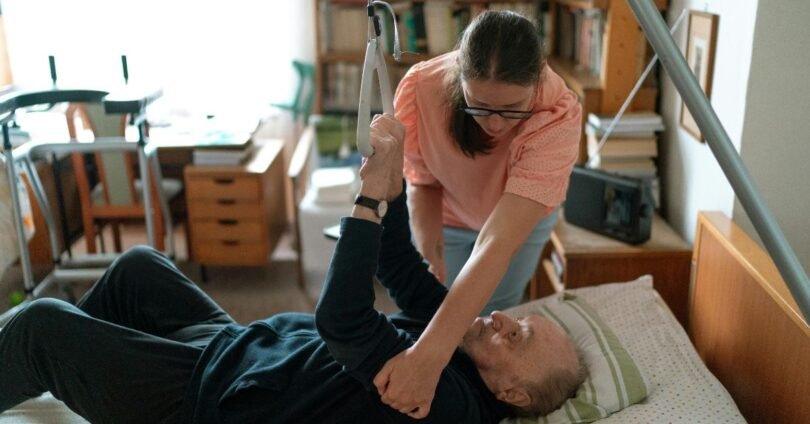Australia’s care sector is experiencing a significant demand for skilled professionals, driven by an aging population and a growing need for quality healthcare services. For international workers, this presents a golden opportunity to secure rewarding care home jobs with visa sponsorship in 2025.
This comprehensive guide explores the landscape of care home employment in Australia, detailing job roles, visa options, application processes, and strategies to succeed in this vital industry. Whether you’re a nurse, personal care assistant, or allied health professional, this article provides everything you need to know to start your career journey in Australia.
The Growing Demand for Care Home Workers in Australia
Australia’s population is aging rapidly, with projections indicating that by 2050, over 25% of the population will be over 65. This demographic shift has fueled a surge in demand for care home workers, including nurses, aged care assistants, and support staff. The Australian government has recognized this need and is actively encouraging international talent to fill critical gaps in the workforce, particularly through visa sponsorship programs.
Care homes, also known as residential aged care facilities, provide essential services to elderly and disabled individuals, offering personal care, medical support, and a safe living environment. The sector faces a shortage of approximately 35,000 workers annually, according to industry estimates, making it a prime opportunity for foreign professionals. Employers, including major providers like Bupa and Anglicare, are increasingly offering visa sponsorship to attract skilled workers from abroad.
This article delves into the top care home jobs available in 2025, the visa pathways that enable international workers to join this sector, and practical steps to secure employment. With competitive salaries, comprehensive benefits, and pathways to permanent residency, care home jobs in Australia are an attractive option for those seeking a stable and fulfilling career.
Top Care Home Jobs with Visa Sponsorship in 2025
1. Registered Nurse (Aged Care)
Registered nurses (RNs) are in high demand in Australian care homes, providing clinical care, administering medications, and coordinating resident care plans. Employers like Opal HealthCare and Regis Aged Care frequently sponsor visas for qualified RNs to address staffing shortages.
Responsibilities:
- Assessing residents’ health and developing individualized care plans.
- Administering medications and treatments as prescribed.
- Monitoring residents’ conditions and responding to emergencies.
- Collaborating with doctors, allied health professionals, and families.
- Maintaining accurate medical records and ensuring compliance with regulations.
Requirements:
- Bachelor’s degree in nursing or equivalent qualification recognized by the Australian Health Practitioner Regulation Agency (AHPRA).
- Valid AHPRA registration or eligibility to register (may require an English proficiency test like IELTS or OET, with a minimum score of 7.0 or equivalent).
- At least 1-2 years of clinical nursing experience, preferably in aged care or geriatrics.
- Strong communication and interpersonal skills.
- Ability to pass a National Police Check and health assessment.
Salary Expectations:
Registered nurses in aged care earn between AUD 70,000 and AUD 95,000 annually, with experienced RNs earning up to AUD 110,000. Benefits often include shift allowances, health insurance, and professional development opportunities.
Visa Sponsorship:
The Temporary Skill Shortage (TSS) visa (subclass 482) and the Employer Nomination Scheme (ENS) visa (subclass 186) are commonly used for RNs. These visas offer pathways to permanent residency, with employers covering most visa-related costs.
2. Personal Care Assistant (PCA)
Personal care assistants, also known as aged care workers or care support workers, provide hands-on support to residents with daily activities, ensuring their comfort and well-being. Organizations like UnitingCare and Catholic Healthcare sponsor PCAs to meet workforce demands.
Responsibilities:
- Assisting residents with personal care tasks like bathing, dressing, and eating.
- Supporting mobility and helping with transfers or walking aids.
- Engaging residents in social activities and recreational programs.
- Monitoring residents’ well-being and reporting changes to supervisors.
- Maintaining a clean and safe environment.
Requirements:
- Certificate III in Individual Support (Ageing) or equivalent, recognized by Australian standards.
- 6-12 months of experience in aged care or a related field (preferred but not always mandatory).
- Basic English proficiency (IELTS 5.0 or equivalent for visa purposes).
- Compassionate demeanor and ability to work in a team.
- National Police Check and Working with Vulnerable People clearance.
Salary Expectations:
PCAs earn between AUD 50,000 and AUD 65,000 annually, with hourly rates ranging from AUD 25 to AUD 32. Shift penalties and overtime can boost earnings, and benefits often include paid training and superannuation.
Visa Sponsorship:
The TSS visa (subclass 482) is commonly used for PCAs, with some employers offering the Regional Sponsored Migration Scheme (RSMS) visa (subclass 187) for roles in regional areas. These visas can lead to permanent residency after 2-3 years.
3. Enrolled Nurse
Enrolled nurses (ENs) work under the supervision of registered nurses, providing essential care in aged care settings. Employers like Estia Health sponsor ENs for visa programs to support their care teams.
Responsibilities:
- Administering medications under RN supervision.
- Assisting with wound care, monitoring vital signs, and other clinical tasks.
- Supporting residents with daily living activities.
- Documenting care provided and communicating with the care team.
- Ensuring compliance with infection control protocols.
Requirements:
- Diploma of Nursing or equivalent, recognized by AHPRA.
- Valid AHPRA registration as an enrolled nurse (IELTS 7.0 or OET B required for registration).
- 1-2 years of nursing experience, ideally in aged care.
- Strong organizational and teamwork skills.
- Police clearance and health checks.
Salary Expectations:
Enrolled nurses earn between AUD 60,000 and AUD 80,000 annually, with additional shift allowances. Benefits include professional development and career progression opportunities.
Visa Sponsorship:
TSS (subclass 482) and ENS (subclass 186) visas are available, with many employers supporting the transition to permanent residency.
4. Allied Health Professionals
Allied health roles, such as physiotherapists, occupational therapists, and speech pathologists, are critical in care homes to support residents’ physical and mental well-being. Providers like BlueCare and HammondCare offer visa sponsorship for these roles.
Responsibilities:
- Conducting assessments and developing therapy plans (e.g., mobility exercises, speech therapy).
- Supporting residents’ rehabilitation and functional independence.
- Collaborating with care teams to integrate therapy into daily care.
- Educating families and staff on therapy techniques.
- Maintaining detailed records of interventions and outcomes.
Requirements:
- Relevant degree in physiotherapy, occupational therapy, or speech pathology, recognized by Australian professional bodies (e.g., Australian Physiotherapy Council).
- 1-2 years of experience in a clinical or aged care setting.
- English proficiency (IELTS 7.0 or equivalent).
- Registration with the relevant Australian professional body.
- Police and health clearances.
Salary Expectations:
Allied health professionals earn between AUD 75,000 and AUD 100,000 annually, depending on specialization and experience. Benefits include relocation assistance and professional development funding.
Visa Sponsorship:
TSS (subclass 482) and ENS (subclass 186) visas are common, with high demand in regional areas leading to RSMS (subclass 187) opportunities.
5. Care Home Support Staff
Support staff, including cleaners, kitchen assistants, and administrative workers, play a vital role in maintaining care home operations. Some employers, particularly in regional areas, sponsor these roles to address staffing shortages.
Responsibilities:
- Cleaning and maintaining hygiene in resident areas (cleaners).
- Preparing and serving meals according to dietary needs (kitchen assistants).
- Managing bookings, records, and resident inquiries (administrative staff).
- Ensuring compliance with safety and hygiene standards.
Requirements:
- Relevant training or certification (e.g., Certificate II in Hospitality for kitchen roles).
- Basic English proficiency (IELTS 4.5-5.0 or equivalent for visa purposes).
- 6-12 months of experience in a similar role (preferred).
- National Police Check and health assessment.
Salary Expectations:
Support staff earn between AUD 45,000 and AUD 60,000 annually, with hourly rates of AUD 22 to AUD 28. Benefits may include meals, accommodation (in regional areas), and superannuation.
Visa Sponsorship:
TSS (subclass 482) and RSMS (subclass 187) visas are used, particularly for roles in regional or remote care homes.
Visa Options for Care Home Jobs in Australia
Securing a care home job with visa sponsorship requires understanding the visa pathways available to international workers. Here are the primary options for 2025:
Temporary Skill Shortage (TSS) Visa (Subclass 482)
The TSS visa allows employers to sponsor skilled workers for temporary roles, with the possibility of transitioning to permanent residency.
- Eligibility: Job offer from an approved sponsor, relevant qualifications, and English proficiency (IELTS 5.0 or equivalent, higher for nurses).
- Duration: Up to 4 years, depending on the occupation and stream (Short-Term or Medium-Term).
- Process: Employers apply for sponsorship and nomination, followed by the worker’s visa application. Processing times range from 2-6 months, with fees of AUD 1,330-$2,770 (often employer-covered).
- Advantages: Includes family members, and Medium-Term stream roles (e.g., nurses) can lead to permanent residency after 3 years.
Employer Nomination Scheme (ENS) Visa (Subclass 186)
The ENS visa offers permanent residency for skilled workers nominated by an employer.
- Eligibility: Job offer, 2-3 years of relevant experience, and English proficiency (IELTS 6.0 or equivalent). Nurses and allied health professionals must be registered with AHPRA.
- Duration: Permanent residency upon approval.
- Process: Employers file a nomination, followed by the worker’s visa application. Processing takes 6-12 months, with fees of AUD 4,115 (often employer-covered).
- Advantages: Immediate permanent residency, including family members, and access to Medicare and social benefits.
Regional Sponsored Migration Scheme (RSMS) Visa (Subclass 187)
The RSMS visa targets workers in regional Australia, offering permanent residency for care home roles in areas like Tasmania or rural Queensland.
- Eligibility: Job offer in a regional area, relevant qualifications, and English proficiency (IELTS 6.0 or equivalent).
- Duration: Permanent residency upon approval.
- Process: Similar to the ENS visa, with a focus on regional employers. Processing takes 6-12 months.
- Advantages: Priority processing for regional roles and access to regional incentives like housing support.
Skilled Independent Visa (Subclass 189)
For highly skilled workers, the Skilled Independent Visa allows entry without employer sponsorship, based on a points-tested system.
- Eligibility: Occupations on the Skilled Occupation List (e.g., registered nurses, physiotherapists), under 45 years old, and high points score (based on age, experience, and English proficiency).
- Duration: Permanent residency.
- Process: Submit an Expression of Interest (EOI) via SkillSelect, followed by an invitation to apply. Processing takes 8-12 months, with fees of AUD 4,115.
- Advantages: No employer sponsorship required, offering flexibility to work anywhere in Australia.
Challenges of Securing Visa-Sponsored Care Home Jobs
While opportunities are abundant, international workers may face challenges, including:
- Qualification Recognition: Overseas qualifications must be assessed by AHPRA or other bodies, which can take 3-6 months and require additional exams or bridging programs.
- English Proficiency: High IELTS or OET scores are required for nursing and allied health roles, which can be a barrier for non-native speakers.
- Visa Processing Times: Delays in visa approvals can postpone employment start dates, requiring careful planning.
- Regional Requirements: Some visas, like RSMS, require working in regional areas, which may involve relocating to less urban locations.
To overcome these, start the qualification assessment process early, invest in English language preparation, and target employers with a history of sponsorship.
How to Find Care Home Jobs with Visa Sponsorship
1. Research Employers
Identify care home providers and healthcare organizations that sponsor visas. Notable employers include:
- Bupa Australia: Sponsors nurses and PCAs for TSS and ENS visas.
- Opal HealthCare: Offers visa sponsorship for RNs and allied health professionals.
- Anglicare: Supports visa sponsorship for regional care home roles.
- Estia Health: Sponsors ENs and PCAs, particularly in Victoria and Queensland.
- BlueCare: Offers opportunities for allied health professionals in regional areas.
Check career pages on these organizations’ websites and contact HR to confirm visa sponsorship availability.
2. Use Job Search Platforms
Leverage job boards that filter for visa-sponsored roles, such as:
- Seek: Australia’s largest job board, listing thousands of care home jobs, many with visa sponsorship.
- Jora: Features healthcare roles with filters for visa sponsorship.
- Indeed Australia: Lists care home jobs with sponsorship options.
- HealthTimes: Specializes in healthcare jobs, including aged care roles with visa support.
Search for terms like “aged care visa sponsorship” or “care home jobs Australia 2025” to find relevant listings.
3. Work with Recruitment Agencies
Agencies like Healthcare Australia and MARS Recruitment specialize in placing international healthcare workers in visa-sponsored roles. They assist with job matching, visa applications, and qualification assessments.
4. Network Strategically
Join professional networks like the Australian College of Nursing or LinkedIn groups for aged care professionals. Attend virtual job fairs or industry webinars to connect with employers. Engage with expat communities on platforms like Reddit’s r/Australia for advice and job leads.
5. Prepare a Strong Application
- Resume: Use an Australian-style resume, highlighting relevant qualifications, experience, and certifications. Include measurable achievements (e.g., “Provided care to 20+ residents daily”).
- Cover Letter: Tailor it to each job, emphasizing your eligibility for visa sponsorship and commitment to aged care.
- Documentation: Prepare qualifications, AHPRA registration (if applicable), English test results, police checks, and references. Ensure documents are translated into English if needed.
6. Apply Early
For TSS and RSMS visas, apply 6-12 months in advance to account for processing times. Skilled Independent Visa applications should be submitted as soon as you meet the points threshold.
Steps to Apply for a Visa-Sponsored Care Home Job
- Secure a Job Offer: Apply to employers offering visa sponsorship. Confirm sponsorship details in the job offer letter.
- Assess Qualifications: Submit qualifications to AHPRA or relevant bodies for recognition. Complete bridging programs if required (e.g., for nurses).
- Obtain English Proficiency: Take IELTS, OET, or another approved test to meet visa and registration requirements.
- Employer Files Nomination: For TSS, ENS, or RSMS visas, the employer submits a sponsorship and nomination application to the Department of Home Affairs.
- Apply for the Visa: Submit your visa application online, including all required documents (passport, qualifications, job offer, etc.). Attend interviews if needed.
- Relocate and Start Work: Once approved, relocate to Australia and begin your role. Employers may provide onboarding support, including accommodation or orientation.
Salary and Benefits for Visa-Sponsored Care Home Workers
Salaries vary by role, experience, and location, with additional benefits enhancing overall compensation:
- Registered Nurses: AUD 70,000-$110,000 annually, with shift allowances and superannuation (11% of salary).
- Personal Care Assistants: AUD 50,000-$65,000 annually, with overtime and penalties.
- Enrolled Nurses: AUD 60,000-$80,000 annually, with professional development support.
- Allied Health Professionals: AUD 75,000-$100,000 annually, with relocation assistance.
- Support Staff: AUD 45,000-$60,000 annually, with meals and accommodation in some cases.
Benefits often include health insurance, paid leave, superannuation, and visa cost coverage. Regional roles may offer additional incentives like housing or travel allowances.
Top Industries and Locations for Care Home Jobs
Industries
- Aged Care: Providers like Bupa and Opal HealthCare dominate residential care.
- Disability Care: Organizations like UnitingCare support residents with disabilities.
- Home and Community Care: Roles for PCAs and nurses in home-based care settings.
- Allied Health Services: Growing demand for therapists in care homes.
- Regional Healthcare: High demand in rural and remote facilities.
Locations
- Victoria: Melbourne and regional areas like Geelong have high demand for nurses and PCAs.
- New South Wales: Sydney and rural areas like Tamworth offer opportunities.
- Queensland: Brisbane and regional towns like Cairns need care workers.
- Western Australia: Perth and remote areas have shortages, with RSMS visa opportunities.
- Tasmania: High demand for regional care home roles with sponsorship.
Tips for Success as an International Care Worker
- Complete Qualification Assessments Early: Start the AHPRA or professional body assessment process as soon as possible to avoid delays.
- Improve English Skills: Invest in language training to meet IELTS or OET requirements, especially for nursing roles.
- Research Regional Opportunities: Regional jobs often have faster visa processing and additional benefits.
- Save for Relocation: Have AUD 5,000-$10,000 saved for initial costs like travel, accommodation, or licensing fees.
- Verify Employers: Use the Department of Home Affairs’ sponsor list to confirm legitimate employers.
- Join Professional Communities: Engage with groups like the Australian Aged Care Quality Agency for support and networking.
Future Outlook for Care Home Jobs
The Australian care sector is expected to grow significantly, with a projected need for 110,000 additional workers by 2030. Government initiatives, such as increased funding for aged care and expanded visa programs, will continue to support international recruitment. Salaries are likely to rise, with registered nurses potentially earning over AUD 120,000 annually in high-demand areas. The focus on regional areas will also create more RSMS visa opportunities, making 2025 an ideal time to enter the sector.
Conclusion
Australia’s care home industry offers a wealth of opportunities for international workers in 2025, with visa sponsorship paving the way for rewarding careers and potential permanent residency. From registered nurses to personal care assistants and allied health professionals, there are diverse roles to suit various skills and aspirations. By researching employers, preparing a strong application, and navigating visa pathways, you can secure a position in this vital sector. Start your journey today by exploring job boards, connecting with recruitment agencies, and taking the first steps toward a fulfilling career in Australia’s care homes.
For the latest job openings, visit Seek, HealthTimes, or employer career pages. Australia needs you—take the opportunity to make a difference in 2025!







